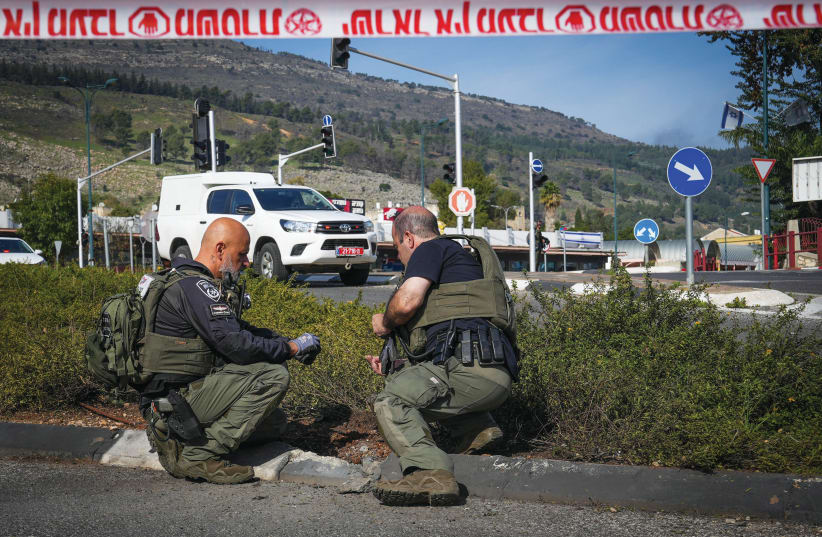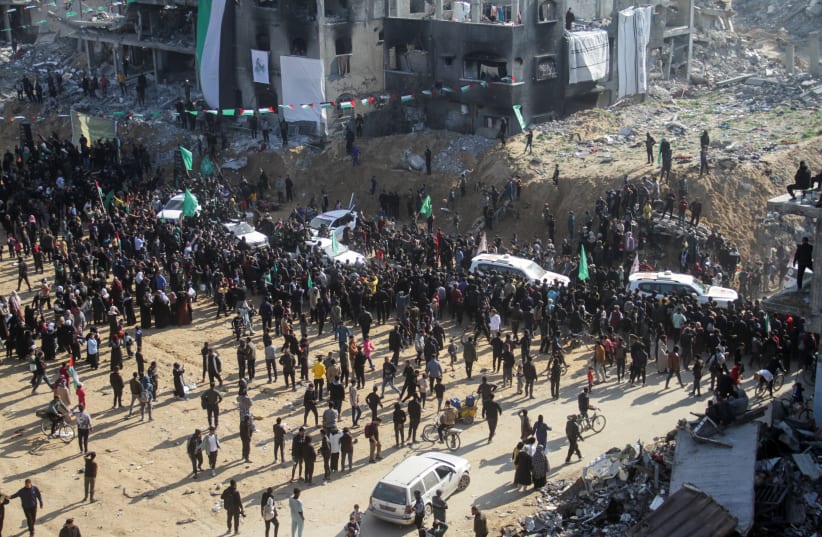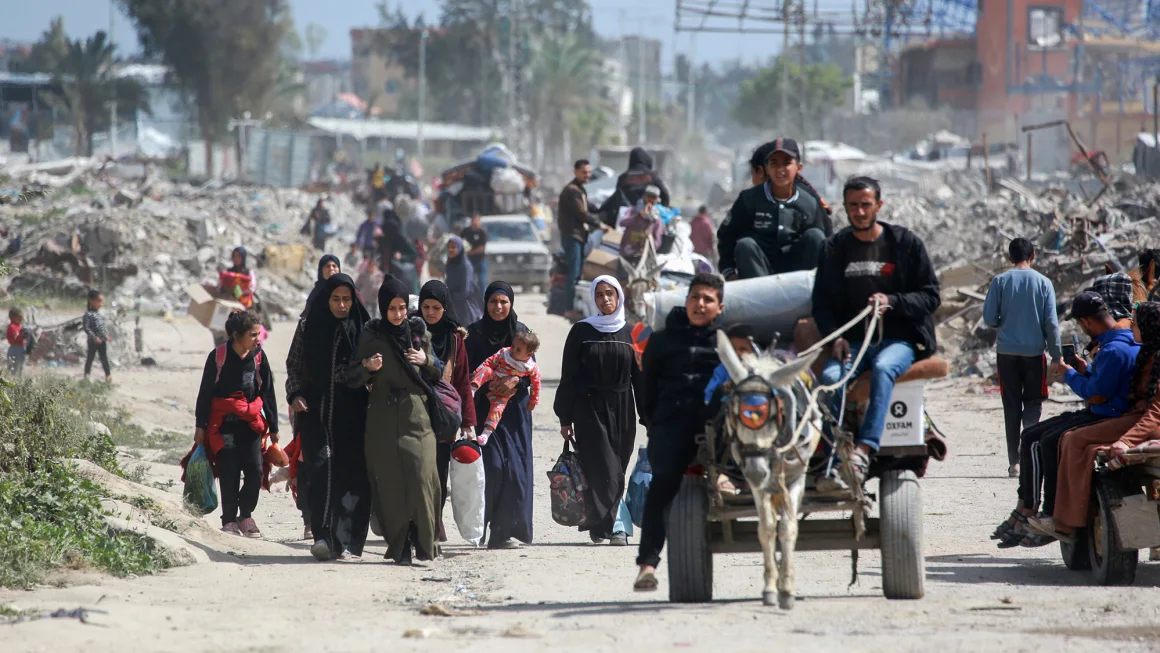Foreign
If Israel is ‘winning the war’ on Hamas, why are rockets falling? – comment

It is too early for the Israeli people to declare victory in the Israel-Hamas war – or even to believe that winning is on the horizon.

ASSESSING THE damage after a rocket fired from Lebanon hit Kiryat Shmona, January 8, 2024.(photo credit: AYAL MARGOLIN/FLASH90)
Gun battles in Gaza, more than 50 rockets launched at Israel in one day, a terrorist attack in central Israel, and still Prime Minister Benjamin Netanyahu, Defense Minister Yoav Gallant, and IDF top brass are boasting of winning the war.
It is too early for the Israeli people to declare victory in the Israel-Hamas war – or even to believe that winning is on the horizon.

Yet our leaders’ strongly worded and assuring statements have acted as a balm on Israeli public consciousness, despite the high IDF casualty count and the failure to secure the release of the remaining 136 hostages in captivity in Gaza.
As proof of public sentiment that success is on the horizon, earlier this week the Jewish People’s Policy Institute released a survey which revealed that showed nearly eight out of 10 Israelis (78%) believe that Israel will win the war.
When asked what victory looks like, 38% said that Gaza is no longer under Hamas control. Another 25% said that border area residents feel safe returning home. Fourteen percent said if the hostages return home.
SO, IS it almost over? Let’s examine the issues.
Hamas resilience:
While aerial photos of the Gaza Strip and reports by foreign media show that Israel has damaged or destroyed at least 70% of the buildings and infrastructure in Gaza, Hamas and its top leaders remain alive and well enough underground.
Moreover, despite Israel’s flattening of the Gaza skyline, the resilience of the remaining fighters and citizens appears high. They still have enough military power to launch rockets at Israel, and Hamas continues its unyielding ground fight, evident in the daily toll on our soldiers.
According to IDF reports, Hamas has experienced limited losses in terms of key military figures, with only three top military leaders out of 14, two brigade commanders, and 19 battalion commanders eliminated. The army is taking out around 10 to 20 terrorists a day, resulting in approximately 9,000 Palestinian fighters being neutralized since October 7, the IDF said earlier this week.
This figure contrasts with the overall death toll of around 24,000 in the enclave, reported by the Hamas-controlled Health Ministry.
Earlier this week, the spokesperson for Hamas’s Izz ad-Din al-Qassam Brigades, Abu Obeida, claimed that “the enemy’s announcements of imaginary achievements regarding rockets and tunnels are a subject of ridicule for us, and the day will come when we prove their falsehood.”
Finally, despite escalating famine and disease threats, the Gazan citizenry has refrained from rebelling against their terror government, a trend likely to persist if the polls prove accurate.
Hostage dilemma:
On Monday, Kibbutz Be’eri announced the death in captivity of two hostages connected to its community, adding to the list of around 20 Israeli hostages who have been reported dead with their bodies still in captivity.
With released Israelis’ testimonies and videos shared by Hamas – though possibly part of psychological warfare – it is probable that the lives of any remaining hostages are in jeopardy.
“The fate of many prisoners has become unknown during the past weeks,” Abu Obeida said in his Sunday statement. “Most likely, many prisoners were killed, and the enemy bears responsibility for their fate.”
Thus far, Israel has rescued only one hostage. Other individuals were released from Gaza during the hostage-prisoner exchange. Since then, Hamas has upped its ante to levels that Israel finds unacceptable.
Israeli media reported that MK Gadi Eisenkot told the war cabinet that Israel had to change tactics if it was to secure the release of the remaining hostages and that “time is running out.” Despite this, Gallant remains steadfast in advocating the continuation of military pressure.
“If the war ends now, the fate of the hostages will be sealed for many years – in Hamas captivity,” Gallant said Tuesday.
Border, sea escalations:
While Israel pounds Gaza, threats on the northern border by Hezbollah and in the Red Sea by the Houthis are escalating.
This week, a Hezbollah missile killed a mother and her son in Moshav Kfar Yuval. While Israel continues to exchange fire with Lebanon, more than 100,000 residents of the area remain displaced from their homes.
At sea, the Houthis have said ships will continue to be targeted until the attacks on Gaza stop – even if the United States and Britain get involved.
“The Yemeni armed forces will continue to prevent Israeli navigation or those associated with the Israeli enemy in the Red Sea and the Arabian Sea until the aggression is stopped and the siege on the steadfast Palestinian people in the Gaza Strip is lifted,” the military spokesperson for the Houthis, Yahya Saree, said Tuesday.
West Bank turmoil: The situation in the West Bank is also unstable, with the IDF operating at unprecedented levels since the start of the war, and public sentiment appearing increasingly supportive of Hamas among the local population.
“In Judea and Samaria, we operate around the clock in the communities and along the axes,” the IDF said in a statement over the weekend. “During the war, we conducted an unprecedented number of offensive activities and apprehended terrorists, some of whom were on their way to commit terror attacks.”
Since October 7, the IDF has apprehended close to 2,700 wanted Palestinians in the West Bank, with over 1,300 of them having affiliations with Hamas.
In an interview with Al Jazeera, a member of the executive committee of the Palestine Liberation Organization equated the situation in the West Bank with that of Gaza, saying that “as Israel committed massacres in the Gaza Strip throughout 100 days of war, it continues its attacks against Palestinians in the West Bank.
“Through repeated raids and attacks, Israel is hoping people will leave voluntarily,” Wasel Abu Yousef said.
Terror in Ra’anana:
This week marked the first internal terror attack outside Jerusalem since the onset of the war. Two West Bank Palestinians, in Israel illegally, initiated the assault, which involved stabbing Israeli civilians and executing a car-ramming attack in the central city of Ra’anana, according to the Israel Police and several witnesses.
The attack left one older woman dead and more than a dozen wounded, some severely. It also rocked the affluent city, to where many American immigrants moved after making aliyah.
Global backlash:
World opinion broadly condemns Israel’s efforts to defend itself against the Hamas terrorist regime, with widespread protests on streets and college campuses. Furthermore, Israel is being forced to defend itself in the International Court of Justice against South Africa’s allegations that it is committing genocide against the Palestinians.
Flattening buildings, destroying tunnels, and killing Arab terrorists are short-term markers in a field with an unknown and possibly unachievable end goal. The people deserve to be given an accurate timeline by their leaders and a comprehensive understanding of what might be at stake if Israel intends to fulfill the mission it declared on October 7.
The writer is deputy CEO – strategy and innovation for The Jerusalem Post and a senior correspondent. She also co-hosts the Inside Israeli Innovation podcast.

Foreign
Hamas claims spokesperson killed in Israeli strike on northern Gaza

Earlier this week, Israel killed Ismail Barhoum, a member of Hamas’ political office, and Salah al-Bardaweel, another senior leader.

Hamas spokesman Abdel Latif al-Qanou was allegedly killed in an Israeli airstrike on northern Gaza, Hamas-affiliated news agency Shehab reported on Wednesday night.

Al-Qanoa was one of Hamas’s most prominent spokesmen in Gaza, and while he avoided media appearances during the months of fighting, he gave multiple interviews to Arab news channels after the ceasefire.
Al-Qanoua was killed when his tent was targeted in Jabaliya, the Hamas-run Al-Aqsa television reported. The same strike wounded several people, medical sources said.
Earlier this week, Israel killed Ismail Barhoum, a member of Hamas’ political office, and Salah al-Bardaweel, another senior leader.
Both Bardaweel and Barhoum were members of the 20-member Hamas decision-making body, the political office, 11 of whom have been killed since the start of the war in late 2023, according to Hamas sources.
Tents for Palestinians seeking refuge are set up on the grounds of a United Nations Relief and Works Agency for Palestine Refugees (UNRWA) centre in Khan Yunis in the southern Gaza Strip on October 19, 2023, amid the ongoing battles between Israel and the Palestinian group Hamas (credit: MAHMUD HAMS/AFP via Getty Images)
The IDF has yet to comment on the alleged elimination.
Increased IDF pressure in the Gaza Strip
Since fighting in Gaza was renewed at the beginning of last week, the IDF has killed 150 terrorists, including 10 top Hamas officials, The Jerusalem Post learned Tuesday.
In certain areas, the military has entered a full kilometer into Gaza, such as around the Nitzanim Corridor in central Gaza.
In addition to central Gaza, Beit Lahia, Beit Hanoun, parts of Khan Yunis, Shaboura, and Tel Sultan, the IDF has been evacuating and moving into Jabaliya.

Foreign
Dead Nigerians, Africans, others without will may lose unclaimed estates in UK

Hundreds of unclaimed estates reveal untold stories of African migration, wealth, and family ties left behind.
Thousands of people die every year in the United Kingdom without leaving a will or identifying next of kin, and among them are many Nigerians and other Africans whose estates—ranging from property to savings—remain unclaimed.
The UK government’s latest list of unclaimed estates, updated daily, includes over 170 entries connected to African-born individuals, with Nigerians making up a significant portion of the cases.

A Legacy Lost
For many migrants, the UK became a home away from home—a land of opportunity where they built wealth, purchased property, and created a life.

However, the absence of a will often results in their assets being classified as “bona vacantia” (ownerless goods), leaving them to the custody of the Crown.
Families back in Africa are frequently unaware of these estates, leading to a permanent loss of assets.
Cases like that of Adenike Adebiyi, who passed away in Hackney, London, in 2004, or Solomon Adekanmibi, who died in Colchester, Essex, in 2021, highlight the consequences of dying intestate.
With no identified next of kin or missing documentation, their estates remain unclaimed, and their legacies risk being forgotten.
Why It Matters
This phenomenon underscores a critical issue: many African families are unaware of their relatives’ financial situations abroad.
Migration often disrupts communication, and without clear documentation, the wealth built overseas remains beyond reach.
The loss isn’t just financial—it’s deeply cultural and emotional. Unclaimed estates represent untold family histories, connections, and the struggles of migrants who built their lives in the diaspora.
The Challenges
Lack of Awareness:
Most families in Nigeria and other African countries are unaware of their relatives’ estates abroad or how to access them.
Genealogical Gaps:
The information provided in official records is often incomplete. For example, many entries in the UK unclaimed estates list lack detailed family history or next-of-kin information.
Cultural Hesitations:
In many African cultures, discussing death and wills is considered taboo, leading to reluctance in planning for asset distribution.
A Call to Action
African governments, community organizations, and legal professionals need to raise awareness about this issue.
Here’s what can be done:
Encouraging Will Writing: Migrants in the diaspora should be educated about the importance of drafting wills to protect their assets.
Genealogical Support: Families in Africa can be assisted in tracing unclaimed estates through local or international partnerships.
Public Awareness Campaigns: Social and traditional media can highlight the importance of estate planning and share resources for families.
How to Check the List
The UK government maintains a public Unclaimed Estates List that is updated daily.
Families can search the list by name, place of birth, or other identifiers to check for potential claims.
Final Thoughts
For many Nigerians and Africans in the UK, their unclaimed estates represent more than just wealth—it’s a story of migration, resilience, and identity.
By addressing this growing issue, families can reclaim their heritage, and the legacy of those who journeyed to the diaspora need not be forgotten.
Here is the latest daily update as of March 24, 2025. Check the list

Foreign
Israel approves controversial proposal to facilitate emigration of Palestinians from Gaza

Israel’s security cabinet has approved a controversial proposal to facilitate Palestinian emigration from Gaza, a move critics warn could amount to ethnic cleansing.

Israeli Finance Minister Bezalel Smotrich on Sunday said the security cabinet approved the proposal by Defense Minister Israel Katz to organize “a voluntary transfer for Gaza residents who express interest in moving to third countries, in accordance with Israeli and international law, and following the vision of US President Donald Trump.”

The decision marks a remarkable endorsement of a plan once considered a far-right fantasy – and comes despite the prime minister’s earlier pledge not to permanently displace Gaza’s civilian population.
Critics have said that any mass displacement of Gazans in the midst of a devastating war would amount to ethnic cleansing, an act associated with war crimes and crimes against humanity under international law. Israeli officials have countered that emigration would be voluntary and in line with international legal standards.
But aid groups argue that Israel’s war has made life in Gaza nearly impossible. Martin Griffiths, the United Nations’ top emergency relief official, has called the enclave “uninhabitable,” saying its people are “witnessing daily threats to their very existence.”
The Israeli approval would establish an administration within the defense ministry “to prepare and facilitate the safe and controlled movement of Gaza residents who wish to voluntarily move to third countries,” according to a statement from the defense ministry.
Its work would include “establishing movement routes, pedestrian checks at designated crossings in the Gaza Strip,” and infrastructure to enable people to leave.
Israeli officials have presented the plan as a fulfillment of a desire by Trump to take over Gaza, expel its Palestinian population to neighboring countries and turn it into a Middle Eastern “riviera.”
The Palestinian Authority’s Minister of State for Foreign Affairs Varsen Aghabekian Shaheen told CNN’s Becky Anderson last month that Palestinians “are steadfast to stay in their land and will not move.”
Trump’s ‘vision’
Katz said Sunday that Israel is using “all means to implement the vision of the US president,” according to the defense ministry statement.
This month, Trump appeared to backtrack on his comments about displacing Palestinians, telling reporters that “nobody is expelling any Palestinians.” Steve Witkoff, the US special envoy to the Middle East, said last month that the US initiative to rebuild Gaza won’t necessarily amount to an “eviction plan” and that it was designed to “shake up everybody’s thinking.”
Last year, Israeli Prime Minister Benjamin Netanyahu said his country had no intention to displace Palestinians or occupy Gaza.
Related articleTrump says ‘nobody is expelling Palestinians,’ weeks after saying they should be moved to Arab states
“I want to make a few points absolutely clear: Israel has no intention of permanently occupying Gaza or displacing its civilian population,” Netanyahu said in a video statement in January 2024.
Trump’s proposal has, however, brought the idea further into the mainstream, with Israeli politicians now openly discussing mass emigration of Gazans as a solution to the war. And Katz last week said that Israel may maintain a permanent presence in the enclave.
Israeli rights group Peace Now criticized the plan, saying “the establishment of the administration to expel Palestinians from Gaza is one of the stupidest moves by a government that has lost all direction and logical thinking.”
The prospect has also drawn sharp rebuke from Arab leaders, especially Egypt and Jordan, who would be expected to absorb the large number of expelled Palestinians. Experts have also warned that displacing Palestinians would further destabilize the region and threaten the security of neighboring states.
Smotrich said Sunday that the security cabinet also approved the expansion of Jewish settlements in the occupied West Bank, noting that 13 areas in the West Bank would be split from existing settlements and would be recognized as independent settlements.
“Instead of hiding and apologizing – we are raising the flag, building, and settling. This is another important step on the path to actual sovereignty in Judea and Samaria,” he said, using the name by which Israelis refer to the West Bank.
The Yesha Council, an umbrella body representing Jewish settlements, said that as of January 2024, there were 150 settlements in the West Bank.
It said that the decision exposes a “long-standing lie that (Israel) does not establish new settlements, but only ‘neighborhoods’ of existing settlements” and that it is “another nail in the coffin that the Government of Israel is preparing for the only chance for a future of peace and security.”
A statement sent by Smotrich’s office said the move comes against “the backdrop of the approval of tens of thousands of housing units in Judea and Samaria and represents another significant step in the process of normalizing and regulating the settlement.”
Smotrich and other right-wing ministers have been pushing an aggressive expansion of settlements on the path to declaring Israeli sovereignty over the West Bank, which would be in defiance of international law and UN Security Council resolutions.
Israel says it will maintain ‘permanent’ presence in Gaza unless hostages are freed

-

 Security3 days ago
Security3 days agoNew Commissioner of Police in Niger, Elleman sends strong warning to criminals
-

 Foreign1 week ago
Foreign1 week agoHouthis declare Ben-Gurion Airport ‘no longer safe’ after renewed Gaza fighting
-

 News2 days ago
News2 days agoKogi Governor, Ahmed Usman Ododo salutes Tinubu at 74
-

 News1 day ago
News1 day agoAbia: LG Chairman, Iheke accused of using soldiers to detain IRS agent, claims Governor Otti’s support
-

 News1 week ago
News1 week agoUmeh denies receiving $10,000 with other 42 Senators to support state of emergency in Rivers
-

 News2 days ago
News2 days agoPlateau LP stakeholders endorses Barr Gyang Zi’s defection to APC
-

 Sports1 week ago
Sports1 week ago2026 World Cup Race: Ekong says Eagles feel great to be back in contention
-

 News2 days ago
News2 days agoAkpabio pays historic visit to office of SA to President on Senate Matters





















